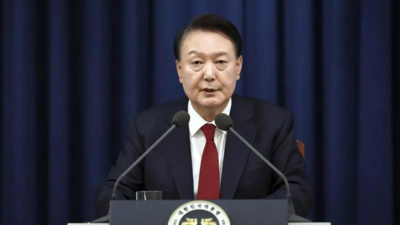
The impeachment of South Korean President Yoon Suk Yeol by the South Korean national assembly has intensified scrutiny over his actions, with investigators now shifting their focus to whether he could face arrest.
Following his suspension from office, the probe into his alleged treason and breach of trust, authorities are into his actions that led to the country being in massive political turmoil as martial law was declared, according to reports by the Korea Times.
Allegations of treason and martial law declaration
The impeachment motion passed by the National Assembly accuses Yoon of treason, centered on his abrupt declaration of martial law earlier this month. Lawmakers have criticised the declaration as lacking any substantial or procedural constitutional basis. Legal experts categorise treason into three levels of culpability: masterminds who orchestrate and direct the activity, key operatives who plan and execute, and participants who act without a defined role. Yoon is being investigated as the alleged mastermind behind the controversial martial law order.
Constitutional court to make final call
After the parliament voted to impeach Yoon, it’s now up to the Constitutional court to make the final ruling if the South Korean president is reinstated or formally dismissed.
The Constitutional Court shall commence its deliberations on Monday, with a maximum timeframe of 180 days to deliver its verdict. However, analysts anticipate a swifter resolution, citing previous presidential impeachment cases. The court took 63 days to reinstate Roh Moo-hyun in 2004 and 91 days to remove Park Geun-hye in 2016 from office.
Should Yoon be removed from office, a nationwide election to select his replacement must take place within a 60-day timeframe.
The Democratic Liberal Party’s chief Lee Jae-myung, commanding a parliamentary majority, called for prompt Constitutional Court action on Yoon’s impeachment while suggesting the establishment of a special committee to enhance government-parliament collaboration.
Will the South Korean president face arrest?
As the investigation continues, there’s a possibility of Yoon becoming the first sitting president to face arrest. The corruption investigation office for high-ranking officials (CIO) has indicated it may pursue an emergency arrest or seek a court-approved warrant if legal conditions are met. Oh Dong-woon, the CIO’s chief, stated that the agency is “willing” to arrest Yoon if required while considering all legal avenues, including summoning Yoon for questioning.
However, such a move would face logistical and constitutional challenges. Yoon continues to enjoy full presidential security and protocol privileges until a formal dismissal. These privileges complicate any attempt to detain him or conduct a search of his residence. The National Office of Investigation (NOI) recently faced resistance from the Presidential Security Service when attempting to search the presidential office, receiving only limited documents.
Also, as the investigation continues, law enforcement authorities have imposed travel restrictions on him as the police and prosecutors examine potential insurrection charges. Seoul law professor Kim Jongcheol had earlier told the New York Times- that a ban on overseas travel “is usually considered a precursor to arrest.”
Intensified investigation and criminal inquiry into Yoon’s action
Multiple agencies, including the prosecution’s special investigation headquarters, the CIO, and the ministry of national defense’s investigation headquarters, are leading the probe. Tensions have arisen as these agencies compete for witness testimonies and evidence, leading to overlapping schedules and jurisdictional disputes.
In addition to the investigation into the martial law declaration, a criminal investigation has also been launched against Yoon. These allegations stem from his and his government and military allies’ actions of deploying armed forces to the National Assembly.
The investigation’s trajectory will likely hinge on whether authorities can secure cooperation from the Presidential Security Service and overcome jurisdictional conflicts among agencies. Efforts to obtain critical evidence, including communication records and testimonies, remain a priority.
Yoon vows to fight
Following his impeachment, Yoon has denied all allegations and declared he would “fight to the end.” He justified the martial law by stating that sending military personnel to parliament was intended as a cautionary message to the Democratic Party. He accused them of being an “anti-state force” that misused their parliamentary majority by delaying the next year’s budget legislation and repeatedly attempting to remove senior officials through impeachment proceedings.
Further, Yoon pledged to pursue legal action to restore his authority. He released a recorded address highlighting his presidential achievements, particularly emphasising enhanced military cooperation with the United States and Japan. These initiatives have now been suspended, according to his statement.
“But I will never give up,” he said.
Key arrests and other leaders implicated till now
Lt Gen Kwak Jong-keun, head of the army special warfare command, and Hong Jang-won, a former deputy director of the national intelligence service, were summoned by separate agencies on the same day for questioning over their alleged involvement.
Kwak faces accusations of deploying troops to disrupt legislative proceedings and collaborating with Yoon and former defense minister Kim Yong-hyun to incite a riot aimed at subverting the Constitution.
The investigation has already seen several high-profile arrests. Kim Yong-hyun, identified as a central figure in the martial law crisis, was arrested earlier and has reportedly chosen to remain silent during questioning.
Additionally, Lt Gen Yeo In-Hyung, former chief of the defense counterintelligence command, was detained for allegedly orchestrating military and police mobilisations to the South Korean national assembly.
Last week, the Seoul Central District Court issued arrest warrants for Cho Ji-ho, commissioner general of the national police agency, and Kim Bong-sik, head of the Seoul Metropolitan police agency. Both are accused of ordering officers to block lawmakers from voting to repeal the martial law decree.






